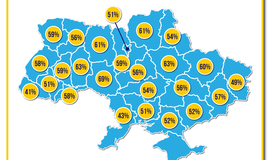News
Healthcare reform will start in early 2018. What should patients and doctors expect
Your doctor
At the initial healthcare reform implementation stage, the changes will touch upon the level of primary care only. Patients commonly receive primary care from professionals such as primary care physicians (general practitioners or family physicians), therapeutists and pediatricians. In developed countries, primary care professionals treat up to 80% of patients without hospitalization (on an outpatient basis) – they apply modern knowledge, use basic equipment, the most common analyzes and prescribed medications. All these services will be 100% funded by the state.
Our goal is to ensure that each and every Ukrainian family has a dedicated family physician (Doctor for Every Family!). Patients can now contact a primary care physician for a consultation, an initial examination or basic diagnosis and treatment of common diseases and medical conditions. Therefore, the chosen family doctors manage and coordinate patient’s health care needs, including treatment options and referrals to specialists. All this means that patients should have confidence in their doctors, while primary care specialists should be motivated, above all – financially, to provide the highest quality services.
Starting in 2018, control over the due implementation of the agreement between a healthcare institution and the state (or conformity of the service to the standard) will be exercised by the National Healthcare Service. Based on these audit results decisions will be made as to whether to cover or not the cost of the service and whether the contract conditions should be revised. This implies switching to a new healthcare financing model: there will be a tariff for every service, and the National Health Service shall pay every hospital for the medical services provided. The tariff will be set for one patient per year as the charge for the services rendered and not for the procedure or visit. Therefore, it should be of benefit to the primary care doctor when patients are healthy, as the primary care institution will receive money for patients when they are healthy: less work for doctors, but the income remains the same. This way doctors will be motivated to take good care of their patients. This model is used worldwide and works effectively in many countries.
Patients should not pay for medical services, as it was before, neither officially in private clinics, nor unofficially in state hospitals. From now on, hospitals will keep records of all services provided and invoice the National Health Service. There will be a tariff for every service, and the National Health Service will pay every hospital for the medical services provided to patients. Top priority medical services will be covered at the expense of the state budget; if a patient wants to undergo a procedure at his own discretion, without a doctor’s recommendation (referral), then s/he has to pay out of own pocket.
What services will family doctor provide to you?
Primary care in Ukraine is not dependent on the permanent residence address, residence registration or amount of the bribe anymore. Every Ukrainian can now choose a family physician, pediatrician or general practitioner at any outpatient medical facility across the country. Moreover, the state covers a basic package of primary care services and medical tests.
Primary care physicians are doctors who serve as the first contact for a person with an undiagnosed health concern and provide continuing care of varied medical conditions. This means that primary care physicians, being well aware of the patient’s healthcare records, provide long-term management of chronic conditions, counsel and educate patients on safe health choices and behaviors. Primary care physician is a specialist who has all records and medical information about your health.
The world experience shows that most health problems can be addressed at the primary care level, especially when patients contact doctors in a timely manner. In addition to the initial examination and treatment, if necessary, primary care physicians also refer patients to specialists, prescribe medicines, including the ones covered under the "Affordable Medicines" Program (National prescription drugs reimbursement program), and issue different medical certificates, sick notes, statements of good health, etc. The main duty of a primary care physician is to prevent or detect early onset of the disease symptoms in a timely manner. And also to provide urgent help in acute conditions and sudden deterioration of health: high body temperature, acute and sudden pain, cardiac rhythm, bleeding, other conditions, diseases, poisonings and injuries in need of emergency care.
The e-system of healthcare (E-Health) will help the National Healthcare Service to track the process in real time and start more thorough checks should there appear any doubts (abnormally high number of redirections to secondary healthcare institutions etc.). The system allows the use of health records of patients, registers of doctors and services actually rendered. The aim is to make access to health services more convenient for patients and help establish contacts among doctors, patients and medical institutions.
Will primary care doctors treat diseases?
Yes, in full compliance with treatment protocols, primary care physicians shall examine patients and offer necessary tests, most of which should be performed immediately in an outpatient clinic. Then, having the results of medical examination and tests, family doctors decide on treatment of acute and chronic conditions.
If necessary, family doctors refer patients to narrow specialists.
Other duties of primary care physicians
Other duties of primary care physicians include:
- disease prevention among patients at risk;
- vaccination according to the recommended immunization schedule;
- medical certificates and sick leaves, etc.;
- prescriptions for medicines, including prescription drugs reimbursable under the "Affordable Medicines" program.
Family doctors in rural areas
One of the focuses of Healthcare reform is creating conditions for improving accessibility and quality of health care services in rural areas. Health care facilities should therefore gain autonomy in managerial and financial decision-making to become more independent, while rural communities should receive additional ambulance stations with the possibility of accommodation of the physician's family, motor vehicles for physicians to be able to travel, new medical equipment, access to high-speed Internet.
Then, it is important to change the rural health care financing model in order to ensure that rural health care facilities receive additional funding for the development of proper infrastructure and rural healthcare providers get competitive salaries in all villages across Ukraine.
Our common goal is simple and clear: to create the necessary conditions and ensure that rural doctors provide health care services of the same quality as their urban colleagues. By offering good conditions for doctor’s life and work, villagers will be able to invite qualified and skilled specialists. In addition to decent salary, qualified doctors willing to work in rural areas will get housing with all utilities, and reimbursement for fuel and other work-related expanses.
Coordination between primary and specialized care
Starting in 2020, the state will cover costs of medical examinations, consultations and appointments by specialists in specialized (secondary) or highly specialized (tertiary) healthcare facilities only upon referral from a primary care physician. According to statistics, most health concerns either can be treated by family doctors without involvement of specialists or require emergency medical services.
Family doctor does not refer patients to particular specialists and / or healthcare institutions, instead s/he only indicates the specialist’s profile and patients choose a highly specialized doctor independently.
By 2020, patients can contact doctors in specialized or highly specialized institutions either upon the primary care physician’s referral, or on their own.
What to do when you need help and your family doctor is currently unavailable
When your primary care physician is not available (for example, is currently on vacation or sick leave), you should contact a back-up physician.
If a patient needs help and is currently in a different city, s/he shall contact the nearest primary care facility.
How to choose your family doctor
The easiest way is to choose a doctor you know well, the one you visited before and were satisfied with both the doctor’s performance and treatment results.
If you do not know any doctor like that, asking for recommendations from coworkers, neighbors, and friends is another good way to start.
You can also contact your local health department office to request a list of doctors who work in your community or district.
Another option is to simply contact any healthcare facility in your locality and ask about doctors who practice family medicine there. Public information about primary care doctors can be requested from the local health department or directly from the front-desk registry. Many healthcare facilities already have their own websites with available information.
Please note that a patient can now choose a doctor without reference to the registered place of residence. Patients just have to decide which physician is best suited to their individual needs and situation: primary care physicians (general practitioners or family physicians) for the entire family, or therapeutists for adults and pediatricians for kids.
Emergency Medical Services
In the case of an emergency or a health condition requiring urgent specialized care, patients should contact the nearest emergency care facility. Treatment of emergency cases is 100% covered by the state.
Specialized and Highly Specialized Care
Reforms of the specialized care financing model will start in 2019 and of the highly specialized care – in 2020. By this time, the primary care reform should be implemented and all necessary statistics collected to facilitate improvement of the secondary and tertiary care as well. At these levels, there will be a transparent tariff for every service, and the National Health Service shall directly pay every specialized or highly specialized care institution for the medical services provided. Tariffs for each service will be the same within the territory of the country and the state will cover 100% of the cost of treatment, including all relevant expenses: medical supplies, medicines, equipment maintenance, and medical staff salaries.
Each year, the Verkhovna Rada of Ukraine will consider priorities and available budget resources to approve the list of services provided under the guaranteed package and relevant tariffs. In other words, depending on the current situation and budget opportunities, the state will annually update a list of healthcare services that are to be paid for by the patient. The first program of healthcare guarantees shall be approved by 2020.
The state will not cover uncritical services such as planned dentistry or aesthetic medicine (the so-called 'red list of services').
What is the guaranteed package of healthcare services
The guaranteed package will clearly define which services will be provided to patients free of charge, which will be covered partially or in full, and what tariffs will be set. This implies switching to the new healthcare financing model: each guarantee will be supported by the source that covers the costs and tariffs will be equal all across the country.
The main goal of these changes is to provide citizens with a package of free services (for example, the so-called "green list" of basic services will be completely free of charge), improve the quality of services and ensure efficient use of the state budget funds for healthcare.
The red list of services
The guaranteed package will consist of “red”, “green” and “blue” lists. The state will not cover uncritical services, which means that patients will pay for the “red” list services, such as planned dentistry, specialist consultation without a referral from a primary care physician, aesthetic medicine. The rates for these services will be set and unified for all medical institutions.
Additional targeted assistance programs will be developed for the disadvantaged groups.



